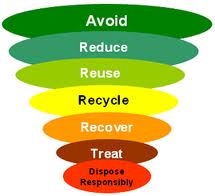|
Read the text and get ready to a test work
RECYCLING TECHNIQUES
 1. Iron and steel are the world's most recycled materials, and among the easiest materials to recycle, as they can be separated magnetically from the waste stream. Any grade of steel can be recycled to top quality new metal, with no 'downgrading' from prime to lower quality materials as steel is recycled repeatedly. 42% of crude steel produced is recycled material.
2. Aluminium is shredded and ground into small pieces or crushed into bales. These pieces or bales are melted in an aluminium smelter to produce molten aluminium. By this stage the recycled aluminium is indistinguishable from virgin aluminium and further processing is identical for both. An aluminium can is 100% recyclable every time it is recycled, it saves enough energy to watch television for about three hours.
3. Glass bottles and jars are accumulated via kerbside collection schemes and bottle banks, where the glass may be sorted into colour categories. The collected glass cullet is taken to a glass recycling plant where it is monitored for purity and contaminants are removed. The cullet is crushed and added to a raw material mix in a melting furnace. It is then mechanically blown or moulded into new jars or bottles. Glass cullet is also used in the construction industry for aggregate and glass halt. Glass halt is a road-laying material which comprises around 30% recycled glass. Glass can be recycled indefinitely as its structure does not deteriorate when reprocessed.
4. Plastic recycling is the process of recovering waste plastics and reprocessing the material into useful products. Compared to glass or metallic materials, plastic poses unique challenges – because of the massive number of types of plastic, they each carry a resin identification code, and must be sorted before they can be recycled. This can be costly – while metals can be sorted using electromagnets, no such 'easy sorting' capability exists for plastics, and compared to paper and metals fewer recycling facilities exist.
From Wikipedia
Test
1. Iron and steel are the world's most recycled materials, and among the easiest materials to recycle, as they can be separated magnetically from the waste stream. Any grade of steel can be recycled to top quality new metal, with no 'downgrading' from prime to lower quality materials as steel is recycled repeatedly. 42% of crude steel produced is recycled material.
2. Aluminium is shredded and ground into small pieces or crushed into bales. These pieces or bales are melted in an aluminium smelter to produce molten aluminium. By this stage the recycled aluminium is indistinguishable from virgin aluminium and further processing is identical for both. An aluminium can is 100% recyclable every time it is recycled, it saves enough energy to watch television for about three hours.
3. Glass bottles and jars are accumulated via kerbside collection schemes and bottle banks, where the glass may be sorted into colour categories. The collected glass cullet is taken to a glass recycling plant where it is monitored for purity and contaminants are removed. The cullet is crushed and added to a raw material mix in a melting furnace. It is then mechanically blown or moulded into new jars or bottles. Glass cullet is also used in the construction industry for aggregate and glass halt. Glass halt is a road-laying material which comprises around 30% recycled glass. Glass can be recycled indefinitely as its structure does not deteriorate when reprocessed.
4. Plastic recycling is the process of recovering waste plastics and reprocessing the material into useful products. Compared to glass or metallic materials, plastic poses unique challenges – because of the massive number of types of plastic, they each carry a resin identification code, and must be sorted before they can be recycled. This can be costly – while metals can be sorted using electromagnets, no such 'easy sorting' capability exists for plastics, and compared to paper and metals fewer recycling facilities exist.
From Wikipedia
Test
|
|